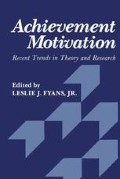Abstract
I am going to take the position of the loyal opposition. I maintain that the state of the art suggests to me that it is time that we stop studying achievement motivation. Like all other psychological variables, achievement motivation is a part of a whole—the whole is a person. It is time that we stopped studying variables and started studying persons in action. Let me explain with a crude analogy about the state of the art of psychology.
Access this chapter
Tax calculation will be finalised at checkout
Purchases are for personal use only
Preview
Unable to display preview. Download preview PDF.
References
Cohen, M.W., Emrich, A.M., & deCharms, R. Training teachers to enhance personal causation in students. Interchange, 1976/77, 7, 34–39.
deCharms, R. Personal causation. New York: Academic Press, 1968.
de Charms, R. Enhancing motivation: Change in the classroom. New York: Irvington Publishers. 1976. (Distributed by Halstead).
Heider, F., The psychology of interpersonal relations. New York: Wiley, 1958.
Koenigs, S.S., Fiedler, M.L., & deCharms, R. Teachers’ beliefs, classroom interaction and personal causation. J. Appl. Soc. Psychol. 1977, 7, 95–114.
Lindquist, F.F. & Hieronymous, A.N. Iowa test of basic skills. Boston: Hough ton-Mifflin, 1955.
Ossorio, P.G. Persons. Boulder, Colorado: Linguistic Research Institute. 1966.
Ossorio, P.G. Never smile at a crocodile. J. Theory Soc. Behav. 1973, 3, 121–40.
Ryle, G. The concept of mind. New York: Barnes & Noble, 1949.
Author information
Authors and Affiliations
Editor information
Editors and Affiliations
Rights and permissions
Copyright information
© 1980 Springer Science+Business Media New York
About this chapter
Cite this chapter
deCharms, R. (1980). The Origins of Competence and Achievement Motivation in Personal Causation. In: Fyans, L.J. (eds) Achievement Motivation. Springer, Boston, MA. https://doi.org/10.1007/978-1-4757-8997-3_3
Download citation
DOI: https://doi.org/10.1007/978-1-4757-8997-3_3
Publisher Name: Springer, Boston, MA
Print ISBN: 978-1-4757-8999-7
Online ISBN: 978-1-4757-8997-3
eBook Packages: Springer Book Archive

